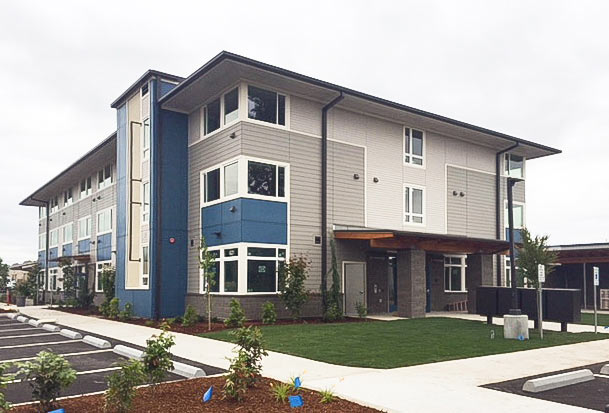
Consider the following facts: A median two-bedroom apartment in Vancouver costs $1,437 — requiring an annual income of $57,480 — but the area median income (AMI) for Vancouver residents is only $52,000. More than half of Vancouver rental residents are “cost burdened” (that is, they spend more than 30 percent of their income on rent).
“Even working families have trouble paying rent,” said Tim Foley, executive director of Second Step Housing.
Add in a measly 5% vacancy rate (the lowest in the Portland Metro area) and you get the picture – there’s an affordable housing crisis right here in our backyard.
In response to rising rental rates, mass tenant evictions and increasing homelessness, Vancouver’s Affordable Housing Fund (AHF) was approved by voters in 2016, and has been effective in funding a significant number of affordable housing projects since then (see accompanying table). In addition to housing construction, acquisition and rehab, the city of Vancouver also uses the AHF for rental assistance and services to help people access housing or avoid eviction, and for projects that provide temporary shelter for people who are experiencing homelessness.
One AHF new construction project, Meriwether Place, is already completed. The project and its use of AHF monies was recently highlighted in the Council of Large Public Housing Authorities newsletter.
“People are so excited to live there,” said Peggy Sheehan, community and economic program manager for city of Vancouver.
The Community Services Northwest Property Rehab is also complete. Three other AHF projects are currently under construction and are anticipated to start renting this year (Isabella Court II, Caples Terrace and McKibbin Commons), which will add a total of 81 units targeted to renters making below 50% of the AMI.
“We’re trying to take care of the most vulnerable population,” Sheehan said. “We have elderly people who have lived in their apartments for years and now can’t afford their rent; the number of homeless people has dramatically increased over the last few years. The more units you build, the more stable housing becomes.”
The 2019 AHF project list includes seven new construction projects, three housing acquisition projects and five housing rehab projects.
“We are really excited about the 2019 list,” Sheehan said, who added that an additional $2 million in 2019 levy funds are available to be awarded for construction/acquisition/rehab projects through a future award process.
Two in-progress AHF new construction projects are by Housing Initiative, LLC, which is owned by the Council for the Homeless. Andy Silver, CEO of Housing Initiative and former executive director of the Council for the Homeless, said the Housing Initiative projects’ strategy is “mission-driven ownership of affordable housing.” He also said that it has been interesting to make the transition from executive director of an agency to CEO of a development company.
“I have learned a whole new world about the development side,” Silver said. “If you are going to ask other people to do something, you have to be willing to do it yourself. What better way to learn what is involved?”
Both Housing Initiative projects focus on providing “supportive housing” designed for people coming out of homelessness with behavioral or health challenges; Housing Initiative will partner with different service providers in the community to provide necessary services. Both projects are also in their second year of AHF funding.
The Pacific, located on Northeast 78th Avenue, is in the final stages of permitting with the city of Vancouver, and Silver hopes to begin construction later this month, with a six-month completion timeframe. The Elwood (formerly “The Shipyard”) is on Fourth Plain near Meriwether Place. Not as far along as The Pacific, The Elwood will ultimately provide 46 units for people making less than 50% of the AMI, and half of those units will be restricted to incomes of less than 30% of the AMI.
Second Step Housing is taking a different approach. Instead of new construction, they are using AHF monies to purchase existing rental properties and convert them to affordable units and to refurbish their existing units. Foley said that by adding a few units each year instead of building large properties, they are creating “affordable units for decades to come.”
While Second Step Housing focuses on people with “high barriers” to stable housing, such as those dealing with substance use disorder recovery, mental health issues or domestic violence, Foley pointed out that “the need touches way more people than that.”
And he said that while the city of Vancouver is “ahead of the curve” compared to most cities or counties, “the need is outpacing the system’s response, even though everyone is scrambling to do as much as we can as fast as we can.”
“The Affordable Housing Fund is a blessing to those of us doing this work,” Foley said. “It’s a big benefit. It’s another arrow in the quiver.”
Vancouver Affordable Housing Fund Awards
| 2017 | 2018-2019 | |
| New Construction | ||
| Units | 258 | 136~ |
| 50% AMI Units | 192 | 133~ |
| Total Funding | $3,887,550 | $3,075,000 |
| Acquisition/Rehab | ||
| Units | 20* | 377 |
| 50% AMI Units | 20* | 219 |
| Total Funding | $484,213 | $2,615,000 |
| Grand Total | $4,371,763 | $5,690,000 |
Source: City of Vancouver Department of Community and Economic Development
*Note: Includes estimate of units to be served through City of Vancouver housing rehabilitation fund; projects are accepted on a rolling basis.
~Note: Unit count excludes two projects that also received 2017 funding and were included in the 2017-2018 unit count (The Pacific and Arnada Workforce Apartments).



